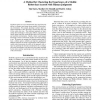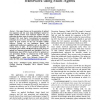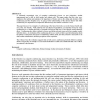279 search results - page 47 / 56 » Learning and reasoning about interruption |
AAAI
2000
13 years 11 months ago
2000
If robotic agents are to act autonomously they must have the ability to construct and reason about models of their physical environment. For example, planning to achieve goals req...
AAAI
1997
13 years 11 months ago
1997
We address the problem of visually detecting causal events and tting them together into a coherent story of the action witnessed by the camera. We show that this can be done by re...
CORR
2010
Springer
13 years 10 months ago
2010
Springer
Cyclic coordinate descent is a classic optimization method that has witnessed a resurgence of interest in machine learning. Reasons for this include its simplicity, speed and stab...
JCP
2008
13 years 9 months ago
2008
- Our paper focuses on the generation of optimal test sequences and test cases using Intelligent Agents for highly reliable systems. Test sequences support test case generation for...
ETS
2000
IEEE
13 years 9 months ago
2000
IEEE
A commonly encountered view of computer conferencing focuses on peer interaction, student empowerment and a shift in both teacher and student roles. This paper argues that this vi...



